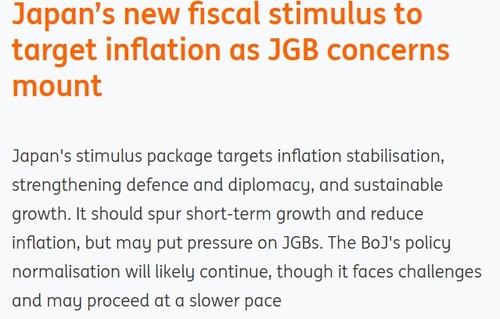
(Seoul=Yonhap Infomax) Yong Wook Kwon – ING Bank expects Japan’s 10-year government bond yield to climb as high as 2% amid concerns over additional bond issuance linked to the government’s latest economic stimulus package.
In an analysis released on the 23rd (local time), the bank stated, “The upward trend in government bond yields will justify sustained inflation at 2.0%,” explaining the rationale behind its forecast.
On the 21st, the Japanese government approved a comprehensive economic package totaling 21.3 trillion yen (approximately 199.2 trillion won or $151 billion), marking the largest stimulus since the pandemic. The package, a core element of Prime Minister Sanae Takaichi’s economic policy, aims to boost growth through expansionary fiscal measures.
To finance the stimulus, the government plans to compile an additional supplementary budget of 17.7 trillion yen.
ING commented, “The large-scale stimulus will significantly suppress core inflation while supporting short-term growth,” projecting Japan’s GDP to expand by 1.4% year-on-year in 2025.
Regarding inflation, the bank noted, “Core inflation is likely to fall below 2%,” but added, “Core-core inflation, which excludes food and energy, is expected to remain above 2% for a considerable period.”
ING observed, “The yield on 10-year Japanese government bonds has recently risen to 1.8% on concerns over additional issuance, and upward pressure is likely to persist until yields reach 2%.”
The bank revised its forecast for the 10-year yield in the first quarter of next year from 1.75% to 1.9%, and for the second half of 2025 from 1.8% to 2%.
ING maintained its view that the Bank of Japan (BOJ) will continue normalizing monetary policy with a total of 50 basis points of rate hikes by the end of next year, but noted, “The exact timing remains uncertain.”
The bank added, “With elevated inflation and a robust economic recovery, the BOJ could raise rates as early as December this year. However, if political factors influence monetary policy, the move could be delayed until March or April next year.”
ywkwon@yna.co.kr
(End)
Copyright © Yonhap Infomax Unauthorized reproduction and redistribution prohibited.

